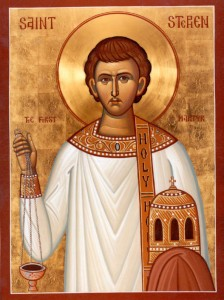St Stephen

Saint Stephen is recognised as the first martyr and a patron saint of deacons and altar servers. In the Acts of the Apostles, it is recorded that he was denounced for blasphemy after a dispute with members of a Jewish synagogue in the year 36. He was one of the first seven deacons ordained by St Peter and the apostles as helpers to look after widows and the poor.
St Stephen worked many miracles and spoke with such wisdom and grace, that many people who heard him, became followers of Jesus. The enemies of the Church of Jesus were furious to see how successful his preaching was.
They could not answer his wise arguments, so they laid a plot and got men to lie about him. These men said that he had spoken sinfully against God. St Stephen faced that great gathering of enemies without any fear. The Bible says his face looked like the face of an angel.
Stephen spoke about Jesus, saying that he was the Saviour God had promised to send. When he was accused of blasphemy, he looked up and said he saw the heavens opening and Jesus standing at the right hand of God. His enemies refused to listen to him. They dragged him outside the city of Jerusalem and stoned him to death.
The saint prayed: "Lord Jesus, receive my spirit!" and he fell to his knees but begged God not to punish his enemies for killing him.
The Feast of St Stephen was already generally known in the fourth century and was celebrated on an equal footing with those of the Apostles. The Apostolic Constitutions of the fourth century said: "Let them celebrate on the day of the first-martyr Stephen."
The Holy Fathers of the fourth century, such as St Gregory the Theologian, St Gregory of Nyssa, St John Chrysostom and St Augustine, preached sermons in honour of St Stephen. In the fourth and fifth centuries, churches were built in his honour.
Many churches around the world are now dedicated to St Stephen including: Brisbane, Australia; Saint Étienne, France, Vienna, Austria, Santo Stefano Rotondo in Rome and Delhi in India. In the Old City of Jerusalem - the 'Lions' Gate' is also called St Stephanus Gate, after the tradition that Stephen's stoning occurred here, though it probably occurred at Damascus Gate.
In London, St Stephen's Chapel in the Palace of Westminster, originally built in the reign of Henry III of England, is named after him. The tower that houses Big Ben, that was officially called 'The Clock Tower,' was referred to as 'St Stephen's Tower' by Victorian journalists and others, until it was renamed Elizabeth Tower to commemorate the Diamond Jubilee of Elizabeth II in 2013.
The Guild of St Stephen, for altar servers, was founded in 1904. For more information see: www.guildofststephen.org/












